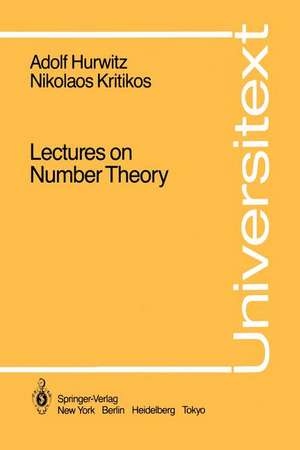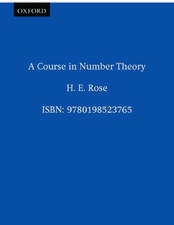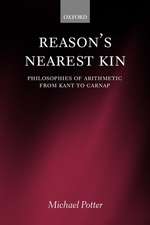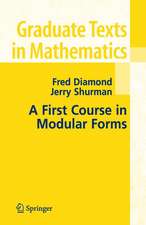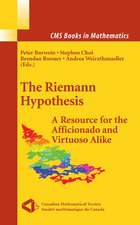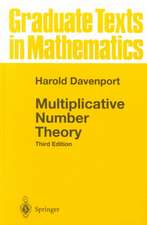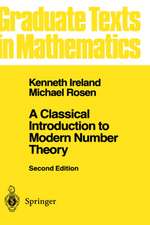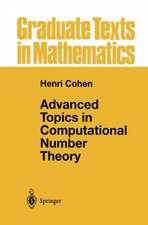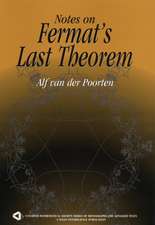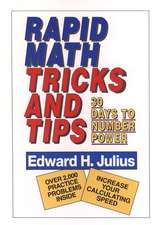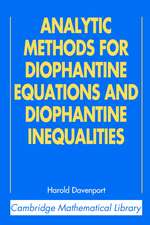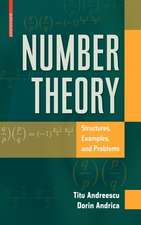Lectures on Number Theory: Universitext
Autor Adolf Hurwitz Editat de Nikolaos Kritikos Traducere de William C. Schulzen Limba Engleză Paperback – 12 dec 1985
Din seria Universitext
- 13%
 Preț: 353.49 lei
Preț: 353.49 lei -
 Preț: 487.96 lei
Preț: 487.96 lei - 15%
 Preț: 543.75 lei
Preț: 543.75 lei -
 Preț: 418.67 lei
Preț: 418.67 lei - 20%
 Preț: 628.22 lei
Preț: 628.22 lei -
 Preț: 322.62 lei
Preț: 322.62 lei - 17%
 Preț: 364.82 lei
Preț: 364.82 lei -
 Preț: 634.38 lei
Preț: 634.38 lei - 17%
 Preț: 427.32 lei
Preț: 427.32 lei - 13%
 Preț: 355.52 lei
Preț: 355.52 lei - 17%
 Preț: 431.50 lei
Preț: 431.50 lei - 19%
 Preț: 429.21 lei
Preț: 429.21 lei - 19%
 Preț: 393.81 lei
Preț: 393.81 lei -
 Preț: 360.08 lei
Preț: 360.08 lei -
 Preț: 358.44 lei
Preț: 358.44 lei - 13%
 Preț: 389.95 lei
Preț: 389.95 lei -
 Preț: 465.61 lei
Preț: 465.61 lei -
 Preț: 371.99 lei
Preț: 371.99 lei - 15%
 Preț: 497.22 lei
Preț: 497.22 lei - 15%
 Preț: 737.46 lei
Preț: 737.46 lei - 17%
 Preț: 394.41 lei
Preț: 394.41 lei - 15%
 Preț: 509.58 lei
Preț: 509.58 lei - 17%
 Preț: 427.68 lei
Preț: 427.68 lei - 8%
 Preț: 495.44 lei
Preț: 495.44 lei - 17%
 Preț: 364.57 lei
Preț: 364.57 lei - 17%
 Preț: 368.15 lei
Preț: 368.15 lei -
 Preț: 396.55 lei
Preț: 396.55 lei - 15%
 Preț: 553.33 lei
Preț: 553.33 lei - 17%
 Preț: 365.35 lei
Preț: 365.35 lei -
 Preț: 356.78 lei
Preț: 356.78 lei -
 Preț: 673.45 lei
Preț: 673.45 lei - 17%
 Preț: 426.76 lei
Preț: 426.76 lei - 20%
 Preț: 569.56 lei
Preț: 569.56 lei -
 Preț: 372.87 lei
Preț: 372.87 lei -
 Preț: 319.07 lei
Preț: 319.07 lei -
 Preț: 379.86 lei
Preț: 379.86 lei -
 Preț: 445.88 lei
Preț: 445.88 lei -
 Preț: 382.36 lei
Preț: 382.36 lei - 15%
 Preț: 533.72 lei
Preț: 533.72 lei - 15%
 Preț: 496.02 lei
Preț: 496.02 lei - 15%
 Preț: 474.82 lei
Preț: 474.82 lei -
 Preț: 389.70 lei
Preț: 389.70 lei -
 Preț: 484.08 lei
Preț: 484.08 lei - 15%
 Preț: 643.48 lei
Preț: 643.48 lei -
 Preț: 415.02 lei
Preț: 415.02 lei - 15%
 Preț: 602.25 lei
Preț: 602.25 lei - 20%
 Preț: 510.24 lei
Preț: 510.24 lei - 15%
 Preț: 588.37 lei
Preț: 588.37 lei -
 Preț: 381.59 lei
Preț: 381.59 lei
Preț: 640.06 lei
Preț vechi: 753.01 lei
-15% Nou
Puncte Express: 960
Preț estimativ în valută:
122.48€ • 130.97$ • 102.12£
122.48€ • 130.97$ • 102.12£
Carte tipărită la comandă
Livrare economică 18 aprilie-02 mai
Preluare comenzi: 021 569.72.76
Specificații
ISBN-13: 9780387962368
ISBN-10: 0387962360
Pagini: 273
Ilustrații: XIV, 273 p.
Dimensiuni: 155 x 235 x 15 mm
Greutate: 0.41 kg
Ediția:Softcover reprint of the original 1st ed. 1986
Editura: Springer
Colecția Springer
Seria Universitext
Locul publicării:New York, NY, United States
ISBN-10: 0387962360
Pagini: 273
Ilustrații: XIV, 273 p.
Dimensiuni: 155 x 235 x 15 mm
Greutate: 0.41 kg
Ediția:Softcover reprint of the original 1st ed. 1986
Editura: Springer
Colecția Springer
Seria Universitext
Locul publicării:New York, NY, United States
Public țintă
ResearchCuprins
1. Basic Concepts and Propositions.- 1. The Principle of Descent.- 2. Divisibility and the Division Algorithm.- 3. Prime Numbers.- 4. Analysis of a Composite Number into a Product of Primes.- 5. Divisors of a Natural Number n, Perfect Numbers.- 6. Common Divisors and Common Multiples of two or more Natural Number.- 7. An Alternate Foundation of the Theory of The Greatest Common Divisor.- 8. Euclidean Algorithm for the G.C.D. of two Natural Numbers.- 9. Relatively Prime Natural Numbers.- 10. Applications of the Preceding Theorems.- 11. The Function ?(n)of Euler.- 12. Distribution of the Prime Numbers in the Sequence of Natural Numbers.- Problems for Chapter 1.- 2. Congruences.- 13. The Concept of Congruence and Basic Properties.- 14. Criteria of Divisibility.- 15. Further Theorems on Congruences.- 16. Residue Classes mod m.- 17. The Theorem of Fermat.- 18. Generalized Theorem of Fermat.- 19. Euler’s Proof of the Generalized Theorem of Fermat.- Problems for Chapter 2.- 3. Linear Congruences.- 20. The Linear Congruence and its Solution.- 21. Systems of Linear Congruence.- 22. The Case when the Moduli $${m_1},{m_2}, \ldots ,{m_k}$$of the System of Congruences are pairwise Relatively Prime.- 23. Decomposition of a Fraction into a Sum of An Integer and Partial Fractions.- 24. Solution of Linear Congruences with the aid of Continued Fractions.- Problems for Chapter 3.- 4. Congruences of Higher Degree.- 25. Generalities for Congruence of Degree k >1 and Study of the Case of a Prime Modulus.- 26. Theorem of Wilson.- 27. The System {r,r2,…,r?} of Incongruent Powers Modulo a prime p.- 28. Indices.- 29. Binomial Congruences.- 30. Residues of Powers Mod p.- 31. Periodic Decadic Expansions.- Problems for Chapter 4.- 5. Quadratic Residues.- 32. Quadratic Residues Modulo m.- 33.Criterion of Euler and the Legendre Symbol.- 34. Study of the Congruence X2 ? a (mod pr).- 35. Study of the Congruence X2 ? a (mod 2k).- 36. Study of the Congruence X2 ? a (mod m) with (a,m)=1.- 37. Generalization of the Theorem of Wilson.- 38. Treatment of the Second Problem of §32.- 39. Study of $$\left( {\frac{{ - 1}}{p}} \right)$$ and Applications.- 40. The Lemma of Gauss.- 41. Study of $$\left( {\frac{2}{p}} \right)$$ and an application.- 42. The Law of Quadratic Reciprocity.- 43. Determination of the Odd Primes p for which $$\left( {\frac{q}{p}} \right) = 1$$with given q.- 44. Generalization of the Symbol $$\left( {\frac{a}{p}} \right)$$of Legendre by Jacobi.- 45. Completion of the Solution of the Second Problem of §32.- Problems for Chapter 5.- 6. Binary Quadratic Forms.- 46. Basic Notions.- 47. Auxiliary Algebraic Forms.- 48. Linear Transformation of the Quadratic Form ax2 + 2bxy + cy2.- 49. Substitutions and Computation with them.- 50. Unimodular Transformations (or Unimodular Substitutions).- 51. Equivalence of Quadratic Forms.- 52. Substitutions Parallel to $$\left( {\begin{array}{*{20}{c}} 0&{ - 1} \\ 1&0\end{array}} \right)$$.- 53. Reductions of the First Basic Problem of §46.- 54. Reduced Quadratic Forms with Discriminant ? < 0.- 55. The Number of Classes of Equivalent Forms with Discriminant ? < 0.- 56. The Roots of a Quadratic Form.- 57. The Equation of Fermat (and of Pell and Lagrange).- 58. The Divisors of a Quadratic Form.- 59. Equivalence of a form with itself and solution of the Equation of Fermat for Forms with Negative Discriminant ?.- 60. The Primitive Representations of an odd Integer by x2+y2.- 61. The Representation of an Integer m by a Complete System of Forms with given Discriminant ? < 0.- 62. Regular ContinuedFractions.- 63. Equivalence of Real Irrational Number.- 64. Reduced Quadratic Forms with Discriminant ? < 0.- 65. The Period of a Reduced Quadratic Form With ? < 0.- 66. Development of $$\sqrt \Delta $$in a Continued Fraction.- 67. Equivalence of a form with itself and solution of the equation of Fermat for forms with Positive Discriminant ?.- Problems for Chapter 6.
